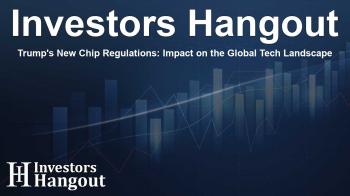Trump's New Chip Regulations: Impact on the Global Tech Landscape

Trump's Strategic Shift in Semiconductor Regulations
President Donald Trump is reportedly moving toward stricter regulations targeting China's semiconductor industry. This potential action is viewed as a continuation of efforts initiated during the Joe Biden administration, aiming to restrict China's technological growth.
Collaborations with Allies
Recent discussions led by Trump officials have included talks with counterparts from notable countries like Japan and the Netherlands. The goal is to limit the activities of engineers from key industry players, including Tokyo Electron Ltd and ASML Holding NV, in China. These conversations suggest a united front among allies to implement constraints similar to those already placed on American semiconductor companies, including giants like Lam Research Corp, KLA Corp, and Applied Materials Inc.
Global Export Controls
The Trump administration is contemplating tighter regulations on the global export of artificial intelligence chips. This move reflects a broader objective to impede China's attempts to bolster its domestic semiconductor industry, a sector crucial for enhancing its military and AI capabilities.
Timeline for Implementation
As these new regulations are evaluated, implementation may take several months. The administration is currently in the process of appointing key staff to federal agencies, which will be crucial for overseeing these changes.
Chinese Response
The Chinese foreign ministry has voiced strong opposition to these potential restrictions. Lin Jian from the ministry expressed that such actions may hinder the growth of the global semiconductor sector and may inadvertently have negative repercussions on U.S. interests.
Impacts on the Semiconductor Market
Amid these developments, President Trump has also announced a significant 25% tariff on imports of auto parts, chips, and pharmaceuticals. This move is expected to create a ripple effect across global markets, heightening tensions in international trade. The tightening of trade policies is likely to lead to increased backlash from nations concerned about fair trade practices.
Increased Demand from Chinese Firms
Reports suggest that major Chinese companies like Tencent Holdings and Alibaba have ramped up their search for AI chips, particularly the H20 AI chip from Nvidia. This surge in demand comes as these firms adapt to potential tariffs and chip export restrictions, highlighting China's resilience and adaptability in the face of external pressures.
The Future of Semiconductor Trade
The unfolding scenario presents a critical moment for the semiconductor industry. While the U.S. aims to assert control over its technological supremacy, China's rapid advancements and strategic alliances could pose challenges. Companies like Applied Materials Inc (NASDAQ: AMAT) and ASML Holding NV (NASDAQ: ASML) will be closely analyzing these developments, as their business prospects may be significantly impacted.
Conclusion
The evolving landscape of U.S.-China trade relations, especially relating to semiconductor regulations, will undoubtedly have lasting effects on global technology markets. As discussions progress and regulations are enacted, all eyes will be on how these policies affect international collaborations and the technological advancements of both nations.
Frequently Asked Questions
What new regulations is Trump considering for China's tech sector?
Trump is assessing stricter measures on China's semiconductor industry, including limitations on foreign engineering activities and exports of AI chips.
How are U.S. allies involved in these discussions?
Officials from Japan and the Netherlands are in talks with U.S. representatives to coordinate similar restrictions on China.
What are the possible impacts of Trump's proposed tariffs?
The new 25% tariffs on auto parts, chips, and pharmaceuticals are expected to escalate trade tensions and disrupt international trade dynamics.
How is China responding to U.S. regulations?
China has expressed that these actions could impede growth in the semiconductor industry and might backfire against U.S. interests.
Which companies are affected by these developments?
Key players include Applied Materials Inc (AMAT), ASML Holding NV (ASML), Lam Research Corp (LRCX), KLA Corp (KLAC), Tencent Holdings (TCEHY), and Alibaba (BABA).
About The Author
Contact Dylan Bailey privately here. Or send an email with ATTN: Dylan Bailey as the subject to contact@investorshangout.com.
About Investors Hangout
Investors Hangout is a leading online stock forum for financial discussion and learning, offering a wide range of free tools and resources. It draws in traders of all levels, who exchange market knowledge, investigate trading tactics, and keep an eye on industry developments in real time. Featuring financial articles, stock message boards, quotes, charts, company profiles, and live news updates. Through cooperative learning and a wealth of informational resources, it helps users from novices creating their first portfolios to experts honing their techniques. Join Investors Hangout today: https://investorshangout.com/
The content of this article is based on factual, publicly available information and does not represent legal, financial, or investment advice. Investors Hangout does not offer financial advice, and the author is not a licensed financial advisor. Consult a qualified advisor before making any financial or investment decisions based on this article. This article should not be considered advice to purchase, sell, or hold any securities or other investments. If any of the material provided here is inaccurate, please contact us for corrections.

